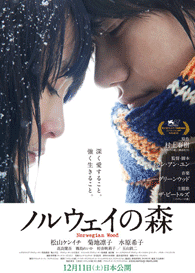
There are a few things working against the film right from the start, the chief problem being the original novel itself. Consisting largely of stream of consciousness interior monologues, the novel also covers too unwieldy a sprawl of topics for a film adaptation. For much of the first act, audiences familiar with the source material will wonder what exactly Tran will cut out from this adaptation, and whether the film characters can transcend their original concept as novelistic characters whose thought processes – rather than speech and actions – provide the narrative’s dramatic momentum. Audiences unfamiliar with the source material may even mistake the film for a work of a lesser arthouse director.
Norwegian Wood takes a while to make up its mind but it when it does so, the film works out brilliantly as a coming of age story where various characters come to terms with their developing sexuality. Murakami here pares down Tran’s script, whittling its cast of characters to just five – two love triangles (one heterosexual, one homosocial) that illustrate an almost Platonic principle that those whose bodies we desire, those whose company we enjoy, and those whose presence we can live with are categories that rarely coincide. The human attempt to unite these divisions propels much of the frantic pursuit of love.
It is clear that Tran’s touch for visual beauty in film has not lessened in his ‘missing decade’, and that Murakami’s rescue job on the original screenplay was very much needed and not at times not sufficiently drastic enough. The ensemble cast, headed by Kenichi Matsuyama (Death Note), perform with virtuosity from an imperfect script. The result is an adaptation that can almost stand on its own right as a work of art.

